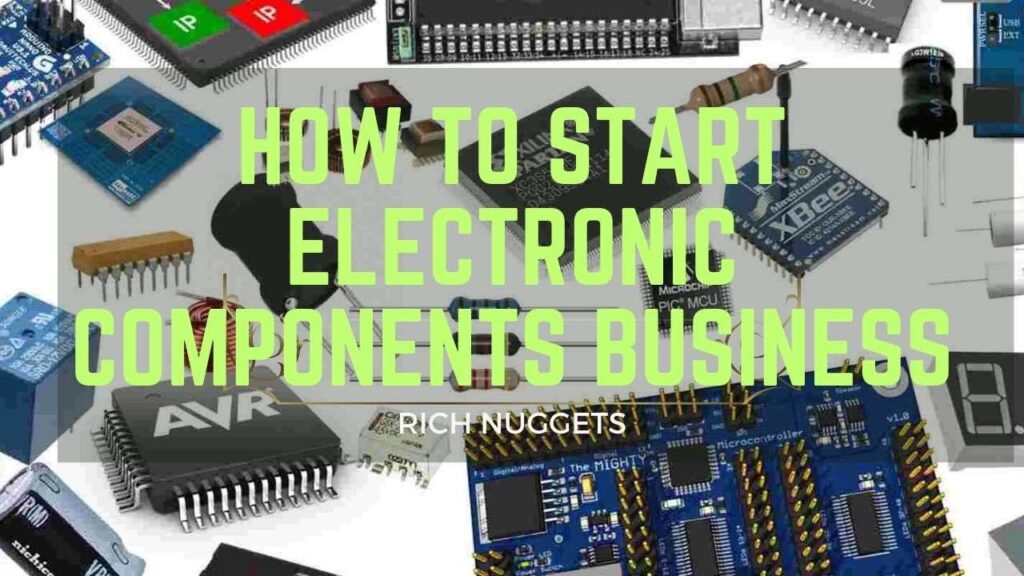In this article “How to Start Electronic Components Business” we reveal to you not just the steps to start the business but also the tips and tricks to Sourcing, Selling, and Succeeding.

An electronic components business is a type of business that specializes in the sale, distribution, and possibly manufacturing or assembly of various electronic components.
Electronic components are individual parts or devices used in the construction and repair of electronic circuits and systems.
These components play a crucial role in a wide range of applications, from consumer electronics to industrial equipment and telecommunications.
Some common electronic components that are typically sold and dealt with in this type of business include:
- Semiconductors: Such as integrated circuits (ICs), transistors, diodes, and other semiconductor devices that control and amplify electronic signals.
- Passive Components: These include resistors, capacitors, inductors, and other components that do not require a power source but play vital roles in controlling electrical properties in circuits.
- Connectors and Interconnects: Connectors, cables, and wires are essential for establishing electrical connections between different parts of a circuit or system.
- Electromechanical Components: Devices like switches, relays, and motors that combine electrical and mechanical functions.
- Power Supplies: Components that provide power, such as batteries, transformers, and voltage regulators.
- Electronic Displays: This category includes items like LED displays, LCDs, and OLED screens used for visual feedback and data presentation.
- Sensors: Electronic sensors detect physical or environmental conditions, such as temperature, humidity, motion, light, and more.
- Electronic Hardware: Fasteners, enclosures, and mechanical components used in mounting and securing electronic components and devices.
An electronic components business caters to various customer bases, including electronics manufacturers, repair shops, hobbyists, and research institutions.
The business may offer a wide range of components and related services, such as technical support, component testing, and custom solutions.
Generally, the electronics industry relies on electronic components to build products and systems, making businesses in this sector essential for a country’s technological development and innovation.
These businesses are crucial in ensuring the availability of quality components and helping various sectors, from telecommunications to healthcare, meet their electronic equipment needs.
Here is how you can start your own electronic components business:
Table of Contents
1. Determine Your Niche:
This step is all about “niching down”. Which means selecting a particular category or type of electronic components to specialize in.
This decision is essential for several reasons such as:
Specialization: By choosing a niche, you’re focusing your business’s attention on a specific category of electronic components. This allows you to become an expert in that area and provide more targeted products and services.
Audience Targeting: Different customer groups have varying needs when it comes to electronic components. Identifying your niche helps you tailor your offerings to the needs of a particular audience, making your business more attractive to them.
Competitive Advantage: Specializing in a niche can set your business apart from more general competitors. It allows you to offer unique and specialized products or services.
Efficiency: Operating in a niche can make your business more efficient. You can streamline your operations, concentrate on specific suppliers, and build stronger relationships within that niche.
For example, within the electronic components industry, you might choose a niche like “semiconductors.” This could mean specializing in various types of semiconductors, such as transistors, integrated circuits, or microcontrollers. Understanding your niche helps you know your industry, your competitors, and your customers better.
And it is also possible to focus on two easily aligned sectors in the electronic component business. For example; semiconductors, connectors, and interconnects.
Ultimately, determining your niche is a strategic decision that shapes your business’s direction.
To know more about the basic steps of starting a business such as the Business Plan and Market Research refer to this article; The Ultimate Guide: How to Start a Business in 11 Simple Steps
2. Get Your Capital Sorted Out:
Getting your capital sorted out is a fundamental step in the business startup process.
It ensures that you have the financial resources needed to not only establish your electronic components business but also sustain its operations.
If, during your research, you find that your budget capital falls short of the estimated capital required, it is recommended to seek additional funding from both internal and external sources.
Here are ways you can source funds for your electronics component business:
- Personal Savings
- Loans
- Grants
- Investors
The capital will be spent mainly on acquiring Inventory, rent and overhead costs, licenses and permits, and working capital.
3. Legal Consideration:
The primary legal requirements for operating your electronics component business in Nigeria include business registration and obtaining your Tax Identification Number (TIN).
For business registration, you have the option of either handling it yourself through the Corporate Affairs Commission website or utilizing their accredited agents.
The cost of registration varies and is contingent upon the specific business structure you intend to use for your electronics component business.
Additional requirements, such as certifications from the Standard Organization of Nigeria and similar entities, are primarily necessary when establishing a manufacturing electronic component company in Nigeria.
4. Source High-Quality Components:
Your electronic components business relies on having a steady supply of high-quality components.
Begin by identifying potential suppliers and manufacturers in the electronic components industry within your city, state, and region if you are going to be running on a small scale. These include wholesalers, distributors, and even manufacturers of components.
However, if your business aspiration is to become a major distributor of electronics components in Nigeria, you can source your inventory from countries like China, Japan, and India.
When evaluating potential suppliers, take into account various factors like product quality, reliability, and pricing to secure the best and cost-effective components for your sourcing needs.
And remember to negotiate terms and agreements that are favorable for your business.
5. Determine Your Sales Channels:
This step is all about determining how you will distribute and sell your products. There are various sales channels to consider when it comes to determining which one perfectly aligns with your business goals and objectives.
Here are sales channel you can exploit in your electronics distribution business:
Direct Sales: Selling directly to manufacturers, wholesalers, or other businesses in need of these components.
Wholesale Distribution: Another approach is to sell your components to wholesalers. Wholesalers, in turn, sell these components to retailers or other businesses. This approach can be efficient if you have a large inventory and want to reach a broader market through wholesalers’ distribution networks.
Online Sales: Leveraging e-commerce websites to expand your reach and tap into a broader customer base that encompasses both businesses and individuals.
By investing on the perfect sales channel that works perfectly for your electronics component business, you can efficiently reach and serve your customers while expanding your market presence.
6. Customer Relationship Management:
Providing excellent customer service is at the core of customer relationship management.
It involves being responsive, attentive, and helpful to customers at all stages of their interaction with your business.
This includes answering inquiries, assisting with product selection, and resolving issues or concerns.
Ensuring excellent customer service should not rest solely on your shoulders but should be a shared responsibility that involves every staff member in your electronic component business.
This underscores the importance of investing deliberate time in training them to perfection.
Effective customer relationship management not only leads to satisfied customers but also can result in customer loyalty and word-of-mouth referrals.
7. Security Measures:
Security measures are essential to safeguard your electronic components business, its inventory, and physical premises.
These measures are put in place to protect your assets from theft, damage, and unauthorized access.
Recomemded security measures that can be put in place to protect your electronics component business are:
- Security Cameras
- Alarm Systems
- Safeguards (eg locked cabinets, extra door protectors)
- Security Personnel
8. Marketing and Promotion:
The ultimate objective of marketing and promoting your electronics business is to reach your target audience, raise awareness about your electronic components business, and attract potential customers.
Here are marketing and promotional strategies that can be implement to achieve your electronics component business marketing objectives:
- Online Marketing (Social Media Marketing, E-commerce Website, Email/Bulk SMS Marketing, Pay-Per-Click (PPC) Advertising
- Offline Marketing (Print Advertising, Trade Shows and Industry Events, Banners, Signage)
- Content Marketing
Whichever marketing strategies you choose to implements, it will take consistency before you can start seeing results.
READ ALSO:
- The 7 Key Steps to Profitability: How to Start an Electronics Business in Nigeria
- How to Start Consumer Electronics Business in Nigeria: Essential Tips and Tricks
- How to Start a Business in Nigeria in 9 Easy Steps
- How to Start Mobile Phone Business in Nigeria as a Retailer or Wholesaler
- How to Start a Phone Repair Business: Your Complete Guide
- How to Start Sales of Mobile Phone Accessories Business in Nigeria
Bottom Line
Starting an electronic components business demands attention to detail, a commitment to quality, and a strong understanding of the industry.
With the right approach and a focus on customer satisfaction, you can establish a successful business that serves the needs of manufacturers, electronics enthusiasts, and various industries requiring quality components.





